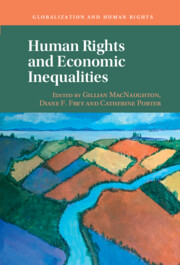Book contents
- Human Rights and Economic Inequalities
- Reviews
- Globalization and Human Rights
- Human Rights and Economic Inequalities
- Copyright page
- Dedication
- Contents
- Figures
- Tables
- Boxes
- Notes on Contributors
- Acknowledgments
- 1 Introduction
- Part I Conceptualizing and Measuring Human Rights and Economic Inequalities
- Part II Causes and Consequences of Economic Inequalities
- Part III Socioeconomic Rights and Economic Inequalities
- Index
- References
Part III - Socioeconomic Rights and Economic Inequalities
Published online by Cambridge University Press: 29 September 2021
- Human Rights and Economic Inequalities
- Reviews
- Globalization and Human Rights
- Human Rights and Economic Inequalities
- Copyright page
- Dedication
- Contents
- Figures
- Tables
- Boxes
- Notes on Contributors
- Acknowledgments
- 1 Introduction
- Part I Conceptualizing and Measuring Human Rights and Economic Inequalities
- Part II Causes and Consequences of Economic Inequalities
- Part III Socioeconomic Rights and Economic Inequalities
- Index
- References
Summary

- Type
- Chapter
- Information
- Human Rights and Economic Inequalities , pp. 245 - 389Publisher: Cambridge University PressPrint publication year: 2021



